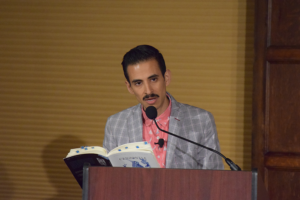
Undocumented immigrant poets face obstacles in the literary world because of their immigration status, poet Marcelo Hernandez Castillo and assistant professor of creative writing at Oklahoma State University Janine Joseph, both undocumented immigrants, said at an event Oct. 16 in Copley Formal Lounge.
Castillo and Joseph lead the national Undocupoets Campaign, which aims to end discrimination based on immigration status in the literary community. Aminatta Forna, Lannan Foundation chair of poetics and interim director, moderated the event.
Undocupoets lobbies for the inclusion of poets without documentation in literary awards, according to Lannan fellow Elizabeth George. It has also partnered with Amazon Publishing to build the Undocupoets Fellowship, which assists undocumented writers with paying entry fees into writing competitions.
The Undocupoets Campaign, which began in 2015, helped bring immigrant authors without documentation into the mainstream literary world, but writers without documentation still face citizenship requirements for publishing, Joseph said.
“People will actually email us and say: ‘Just so you know I tried to submit my work for this particular prize and, you know, I worked on my submission for a long time and right as I was about to hit submit, I realized you could only be a citizen just to submit your work’,” Joseph said.
Literature can be a form of activism, fighting stereotypes and misperceptions about immigrants, according to Joseph. She said she hopes her book “Driving Without a License,” published in 2016, will defy her teachers’ and peers’ expectations for her as a poet.
“I realized that now, I was catering to a type of reader and a reader that was wanting for me to be more ethnic and more exotic … this book is actively resisting all of that,” Joseph said.
Castillo’s poetry emerged out of his experience as an undocumented immigrant, as writing served as an outlet to express his emotions, he said.
“I couldn’t say a lot about me and yeah, I wanted to say all of it but finally I was just tired. I was tired,” Castillo said. “It was cathartic to locate myself in a poem. Just to start there. Not even to locate the poem in a place or in a time but just to locate myself in a poem.”
Teachers’ biases and expectations surrounding themes of immigration in poetry shaped Joseph’s writing, she said. Teachers encouraged Joseph to write more about her Filipino heritage and her experience growing up in America, she said.
“[In workshop] people would ask me to put in more of the Philippines. More of your experience as someone who was born in the Philippines,” Joseph said. “I was largely educated in English so though I understand a lot of Tagalog, it seemed weird to just pick and choose which of these words am I going to switch into another language”.
The challenges with overcoming biases and discrimination that undoccumentd poets face in the literary world begin at a young age, Castillo said.
“[My brother an I] went to the flea market to go buy [my first car] and it was between this red Pontiac and this brown Ford Torres and I was 18, you know, I wanted this red Pontiac but I knew I had to get this brown sudan because it blended,” Castillo said. “That translated over into everything that I did.”
Joseph, who flew to America on a tourist visa from the Philippines, said that the media’s coverage of undocumented immigrants exacerbated the discrimination and fear she felt because of her undocumented status.
“I grew up in Southern California and pretty much every single day there was some kind of story about what was happening in the U.S.-Mexico border and what was happening in Southern California and what was happening in parts of California that I couldn’t go to because I was afraid of checkpoints,” Joseph said. “And so that shaped my understanding of who I was in the eyes of America and in the eyes of America I was someone who had crossed the border by foot.”
The obstacles undocumented immigrants face permeate all parts of life, Castillo said, describing a feeling of having constant supervision as an undocumented immigrant.
“We like to think that the border exists down in the U.S.-Mexico side but, you know, the reality is that the border, we take it with us,” Castillo said. “It’s this overwhelming, oppressive force that always exists on top of you. You think that at any moment, somebody can come.”




















